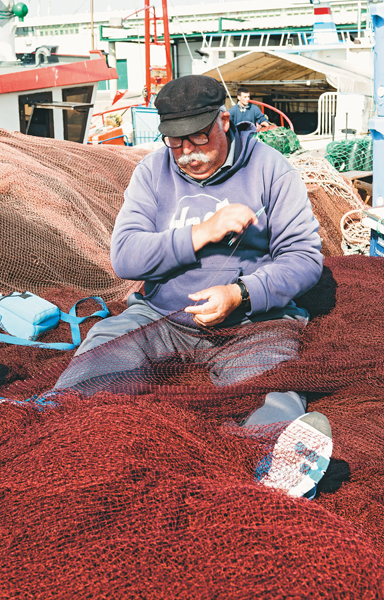
THE fishing village Mastosinhos in Porto once housed more than two hundred fábricas de conservas, which mainly processed Portugal’s famous sardines. New food safety regulations and a demand for higher quality meant the end for many of these factories. Because they held onto their traditional ways for too long, they weren’t able to modernise. A bit further north in the fishing village Póvoa de Varzim, fishing workplaces met their demise. The factories were only running when sardines populated the Portuguese coast – from April to October – but employees would continue to be paid throughout the rest of the year. These businesses valued their employees highly because they would be nowhere without the women – who comprised the bulk of the workforce – who carried out the manual labour. This model, however, was not profitable enough to sustain.
THE family running A Poveira realised they needed a change of approach. They were selling their sardines under the well-known name Minerva and were able to find investors who believed in the future of supplying high-quality tinned fish. Changing their methods would lead to an even higher quality. They closed down their old factories and opened a new cannery in Póvoa de Varzim, where, in addition to sardines, they are able to process different fish, which means employees can work throughout the year.
A Poveira’s ultra-modern factory might look less appealing than an old-fashioned version, but its production of the highest-quality tinned fish is what matters. Skilled women are still at the heart of the company. Rather than going into mass production, which often leads to loss of flavour in the final product, A Poveira combines modern techniques with the skilled work of dedicated craftswomen to achieve even better-tasting fish.
MANY manufacturers fill their tins with raw fish which are then heated to 100°C/200°F after sealing – cooking and sterilising the fish at the same time. This approach generally leads to loss of flavour. A Poveira first steam their sardines and mackerel, after which skilled labourers carefully clean and pack the fish into the tins, sometimes with herbs and spices. The tins are then filled with good-quality olive oil, water or a sauce, depending on the product. Finally, the tins are sealed mechanically and briefly sterilised.
A Poveira uses tastings to convince their visitors that their approach works. Premium brand Minerva’s Portuguese sardines have a distinctly pure flavour. The Fish Tales sardines are made by the same people. The flesh on the removed bone still has that characteristic rose-tinted colour of fresh sardines. The mackerel’s strong flavour and meaty bite also impress.
‘TU é eu, nós dois’, is tattooed on many a woman’s skin. You and me, always together. The man at sea, the woman on land, always connected. The men run the seas, but women rule the dockside. They take the crates of fish from the men, sort the fish and clean them in the factories. Men have earned their place in the fish trade though. You can recognise their warehouses by the pictures of famous football teams like FC Porto and Sporting Portugal.
A Poveira couldn’t have timed the new development better. High-quality tinned fish is gaining in popularity – and not just in Portugal. Young entrepreneurs like José Ricardo Silva are capitalising on this trend.
SILVA opened a pop-up store in Porto around Christmas 2013. It was a success and Silva decided to open a permanent shop: Central Conserveira da Invicta. The sardines are supplied by A Poveira and Silva designs the tins himself. You won’t find tins as colourful and vibrant as these anywhere else. The Porto town centre is home to a couple of speciality stores, like A Favorita do Bolhão, that stock a wide range of tins.
AND here’s some more tips to remember when you’re on holiday visiting the wonderful city of Lisbon. Go to the Conserveira de Lisboa in the old city centre of Lisbon. You’ll find a shop with a 1930s-style interior design where the walls are lined with tins. The proprietors produce their own tinned fish and create sauces to accompany the sardines. Café Sol e Pesca in Lisbon simply has tinned fish with bread and a delightful wine on the menu – a perfect combination. Mercearia das Flores in Porto also serves tinned fish, with the local bread delicacy, broa, made from cornflour. If you want to go upmarket, visit Can the Can in Lisbon where the chef offers innovative dishes using fresh as well as tinned fish.